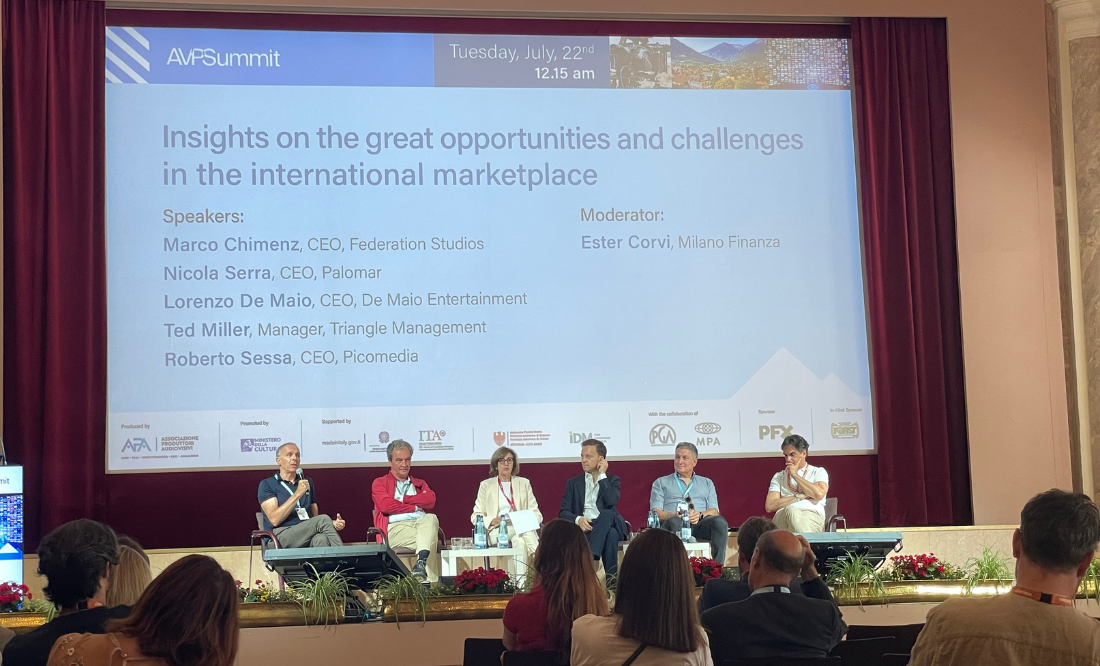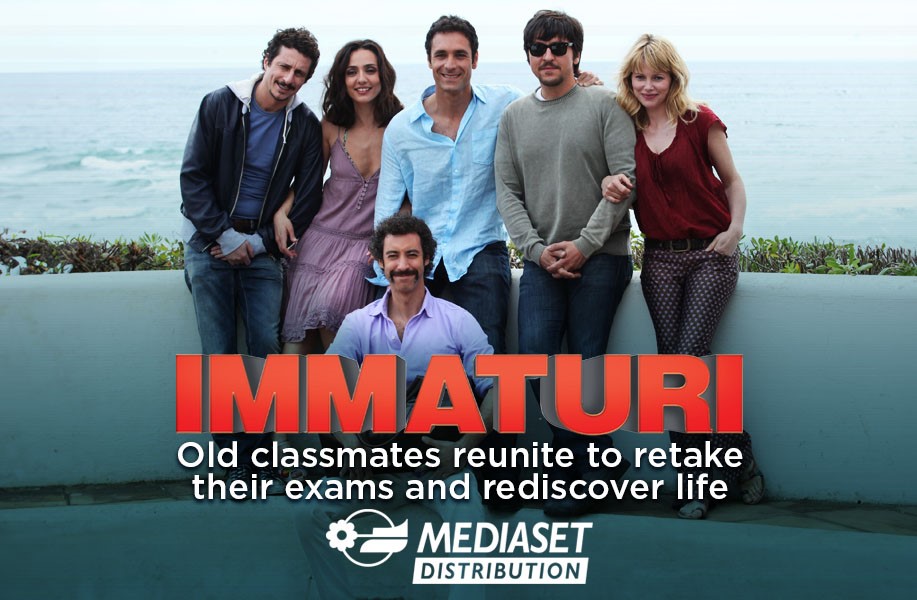At the recent panel “Insights on the Great Opportunities and Challenges in the International Marketplace,” held as part of AVPSummit (Merano, July 21-23, 2025), top European and international producers gathered to debate the evolving business models shaping the audiovisual industry. Moderated by Ester Corvi of Milano Finanza, the panel featured Marco Chimenz (CEO, Federation Studios), Nicola Serra (CEO, Palomar), Lorenzo De Maio (CEO, De Maio Entertainment), Ted Miller (Manager, Triangle Management), and Roberto Sessa (CEO, Picomedia).
The discussion navigated the pressing issues of market consolidation, creative independence, language strategies, and the state of intellectual property (IP) in a fragmented regulatory environment. All participants agreed: while there are significant opportunities, producers face mounting challenges in navigating a fast-changing international market.
Consolidation: Between Efficiency and Creative Chaos
Ted Miller opened the debate with a sharp analysis of market consolidation, particularly in the U.S. and Europe:
"Consolidation is complicated because while there might be economies and efficiencies, it ultimately leads to chaos, and it doesn’t generally inspire great creativity at the outset." Miller cited the strategic shifts at major U.S. players like Disney, Warner Bros. Discovery, and Skydance, all driven by varying economic imperatives but collectively resulting in confusion, reduced studio capacity, and a narrowing of creative avenues. He warned:
"We've seen studios, executives, and creative projects taken out of the equation, creating complexity for those who remain — especially artists and producers who want to make content."Yet Miller remains an optimist, asserting that opportunities can emerge from this chaos for those with the determination to persevere. He also advocated for a balanced approach between developing original content and leveraging established IP:"IP can be very strong, but we shouldn’t rely only on it. Film and television have always been inspired by origination — every IP started somewhere. I always push for that balance in my business."
Streamers, the U.S. Market, and the Challenge of Foreign Content
Miller also provided a critical historical perspective on how streaming platforms reshaped — and later constricted — access to the U.S. market for foreign productions:"Ten years ago, before the streamers evolved their strategy, you couldn't find a European or foreign show in the U.S. With rare exceptions like HBO or PBS. The good thing streamers did was open the American audience's eyes to foreign content — they became great partners for international series. But now, they’ve shifted to focusing solely on their own original productions, leaving everyone else out cold."He explained that traditional U.S. buyers still show little appetite for foreign content, creating a tough landscape for European producers:"Our job is to break through hurdles, to open U.S. executives’ minds to international stories. There is an American audience for access, settings, stories, and language — but it takes time."
For Miller, the U.S. market is now akin to "gravy" — not the core target, but a bonus when possible, often requiring intermediaries or financiers to bridge the gap before productions can reach American buyers.
The Absence of an Italian Production Group
Nicola Serra of Palomar pointed out a structural gap in Italy's industry fabric:"There are many European giants, but no Italian group. This is a key feature of our industry and an element that holds us back." Serra reflected on past attempts to form a consolidated Italian group, recounting conversations with Marco Chimenz over a decade ago:
"We tried, but it was an impossible dream. Consolidation happened rapidly, but only on a European scale — never at a local level first." Despite these challenges, Serra highlighted the benefits of Palomar’s acquisition by Mediawan, which expanded their capacity for international and English-language productions, including collaborations with the BBC. Yet, he also stressed the ongoing problem of fragmented European regulation when it comes to IP protection:"We need centralized oversight at the European level to protect IP effectively, but moving forward, it remains very fragmented and difficult."
Language Choices and Production Strategies
Lorenzo De Maio addressed the strategic decision-making process producers face when choosing between creating content in local languages versus English:"It's a decision we have to make all the time. With higher budgets especially, you have to weigh whether to stick to the authenticity of the local language or aim for broader international appeal with English." This constant negotiation reflects the evolving nature of the global market, where cultural specificity must often be balanced with commercial viability.
Redefining Independence: A State of Mind
Marco Chimenz offered a philosophical and practical take on what it means to be an independent producer today. Reflecting on his own journey with Federation Studios — including periods of selling and reacquiring company shares — he argued:"Independence is really a state of mind."Chimenz recounted advising a group of European producers who were exploring integration but feared losing their independence:"If you fully own your company but go to a streamer who imposes rigid terms and you have no negotiating power, you leave the room feeling crushed — despite your 'independent' label."For Chimenz, independence is less about ownership percentages and more about having the creative and strategic leverage to negotiate terms and maintain control over content vision:"It's not a matter of shareholding; it's about your mindset and your position in the marketplace."
Toward Greater Collaboration and Storytelling Authenticity
Across the panel, there was consensus on the need for greater communication and collaboration among producers to create authentic and universal stories. In an increasingly fragmented and competitive market, shared knowledge, creative alliances, and strategic partnerships will be crucial to navigate the uncertainties ahead.
In a business defined by rapid change, the producers’ message was clear: storytelling is still the heart of the industry — and there is a global audience ready to engage with diverse, compelling narratives if the right pathways are built.











